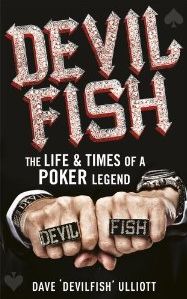Bright Lights, Late Nights and Fame at Last, Part 2
This is an excerpt from Dave ‘Devilfish’ Ulliott’s book "Devilfish – The Life & Times of a Poker Legend". This week we have a competition where you can win one of 3 copies of the book. Enter the competition in this thread on the forum. Buy Devilfish – The Life & Times of a Poker Legend from Amazon.co.uk.
It was strange, seeing the cameras for the first time. It went against everything that a poker player learns how to do – to protect your cards, never to reveal what you’ve got, to play against the odds when necessary. Most of all, to bluff. A big part of my game was bluffing. I knew I had a strong table image and I knew I didn’t give a toss about taking any player on, and I knew that they all knew that about me too. Which puts you in a strong position to bully people off hands and out of pots. This show, though, was going to reveal how we all played and when we bluffed and when we didn’t. I knew that being on TV would make any player with an obvious tell vulnerable in future. Because the show’s audience wouldn’t only be casual poker players: plenty of professionals would be tuning in, and every player involved in the show would watch it back to try to pick up clues.
So in some ways it felt like a risk, but then I thought that it could just as easily work in my favour. If other players saw me bluffing them off hands, it might make them more likely to go up against me in future when I was actually holding a strong hand. I knew I wasn’t easy to read as a player, so I could use that.
Another thing in my favour was that I tried to play different people in different ways. It depended on the player: some people you’d have to check to ’em to get them to bet. Others you have to bet into them and hope they decide you’re bluffing, or you hope they’ve found a good second-best hand, and then come over the top of you with a re-raise.
Anyway, poker had never been on TV before and this was going out late on Channel 4, so none of us really expected it to set the world on fire. It would be a start, that’s all. Each of the five heats would go out at 1 a.m. on a Saturday night (well, Sunday morning, if you want to split hairs), for five weeks, and then the final would be shown on the sixth. It seemed to us that everybody would be out pubbing and clubbing on a Saturday night, but what did we know?
Still, getting some time on TV would be good for me, and I could finally show my mam and dad and Mandy and the kids what I’d been doing for all those years when I used to disappear.
What was happening was that people were coming home from the pub – from students to young guys to older blokes – and instead of watching the kind of crap that’s usually put out on a Saturday night as a punishment for not going out, they had all started watching Late Night Poker instead. And got hooked on it straight away and told all their mates.
At first it seemed odd to me because it was just a poker game. But when I watched it back on the telly I could see exactly what they’d done with it. They’d made it look like a dark little poker club, not a big studio. And the hole-cam thing was great for showing who was bluffing, who was slow playing, who was trapping. When you saw it edited together it was like a scene from a film. But it was better because you had Jesse May and Nic Szeremeta building up the drama with their commentary; Jesse would be going mad, shouting as if he was watching heavyweight boxing, and Nic’s commentary would be much quieter. I could see why people were hooked.
This week we have a competition where you can win one of 3 copies of the book. Enter the competition in this thread on the forum.
Buy Devilfish – The Life & Times of a Poker Legend from Amazon.co.uk

